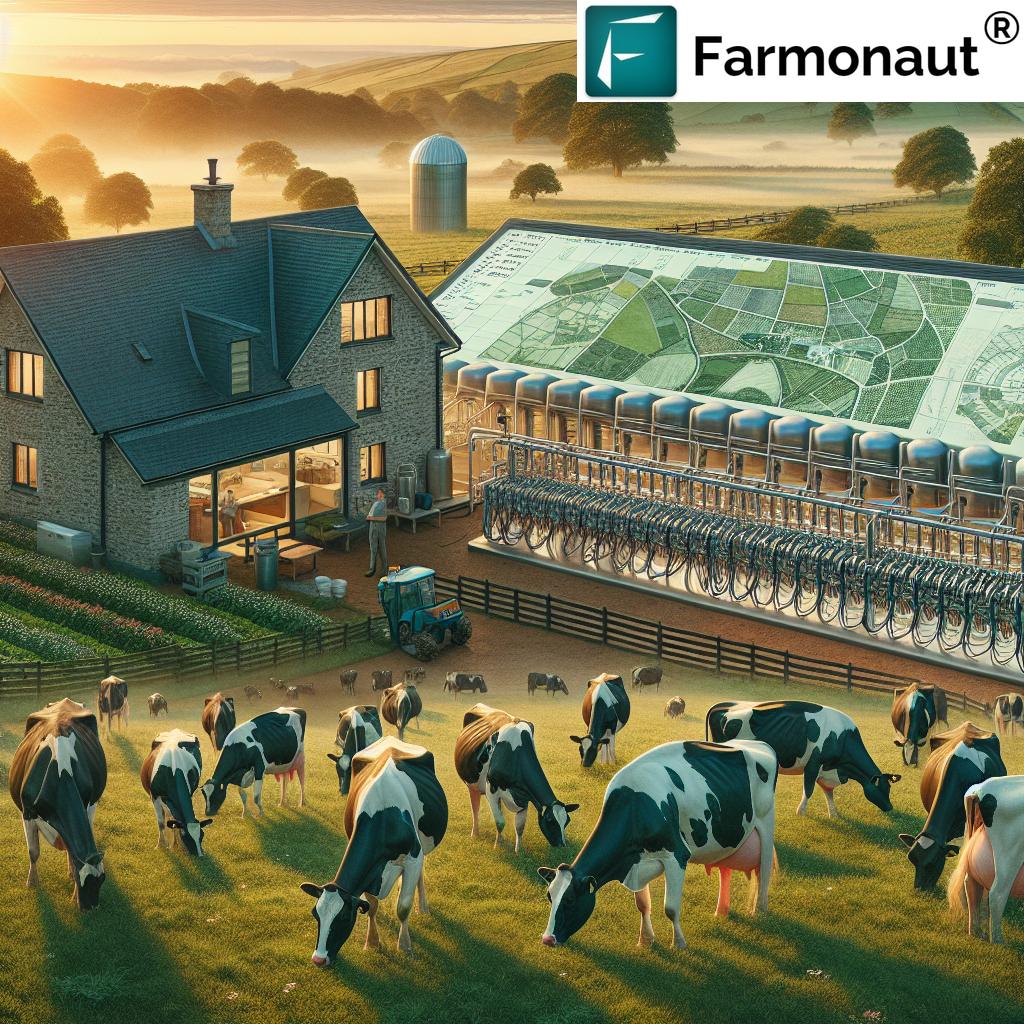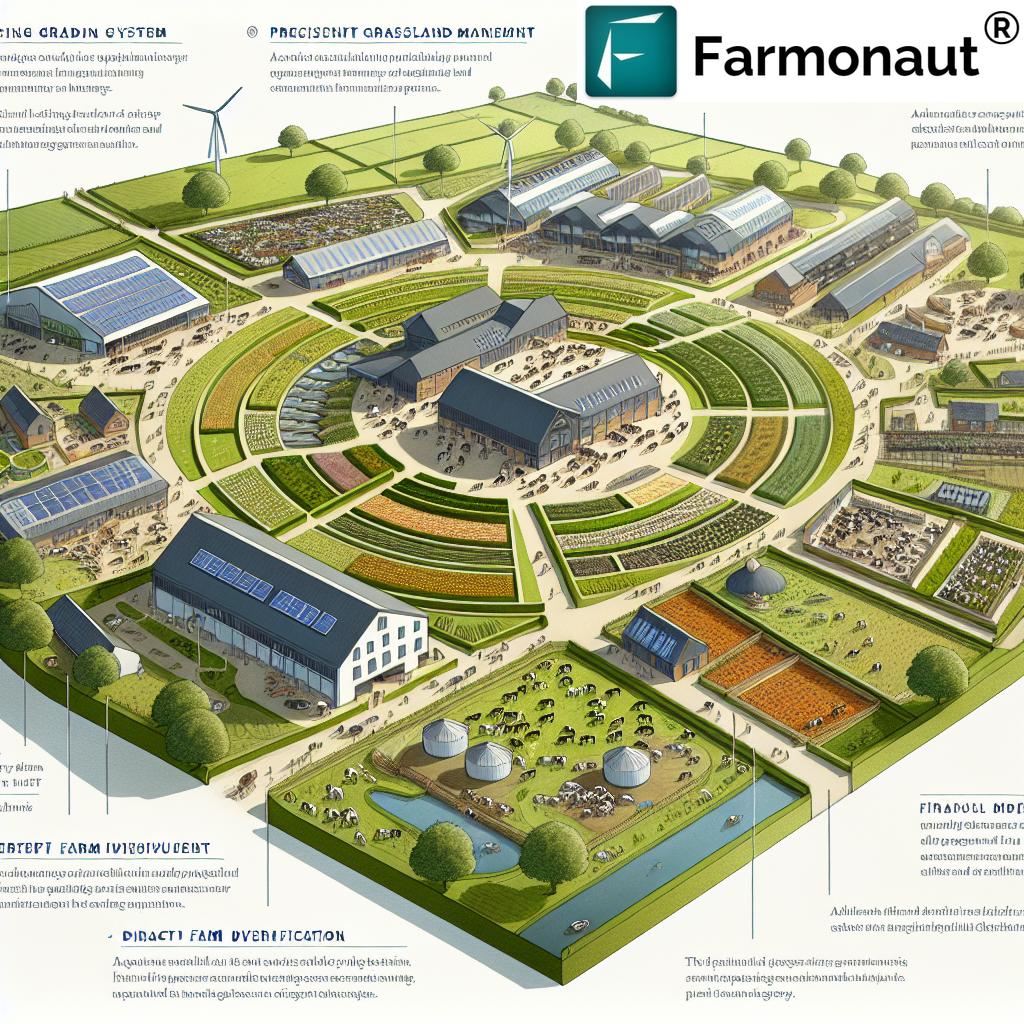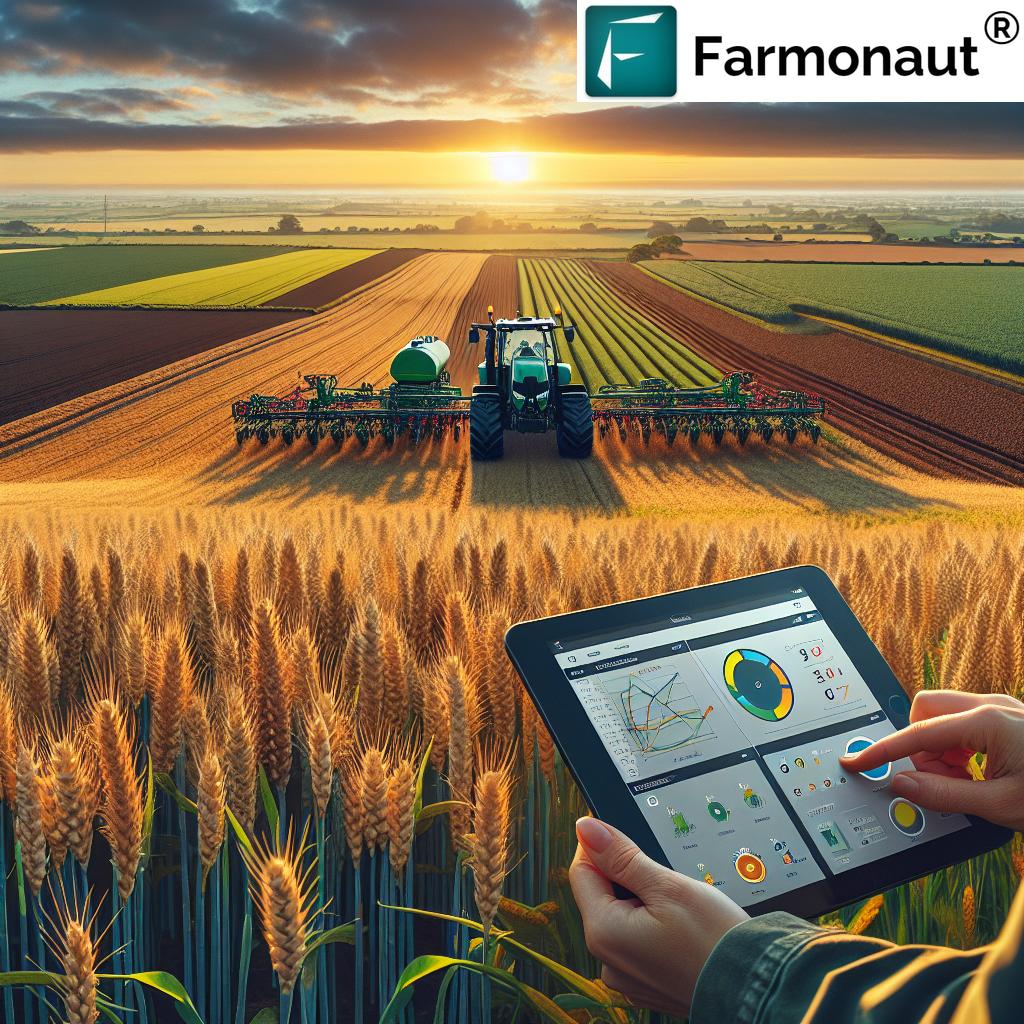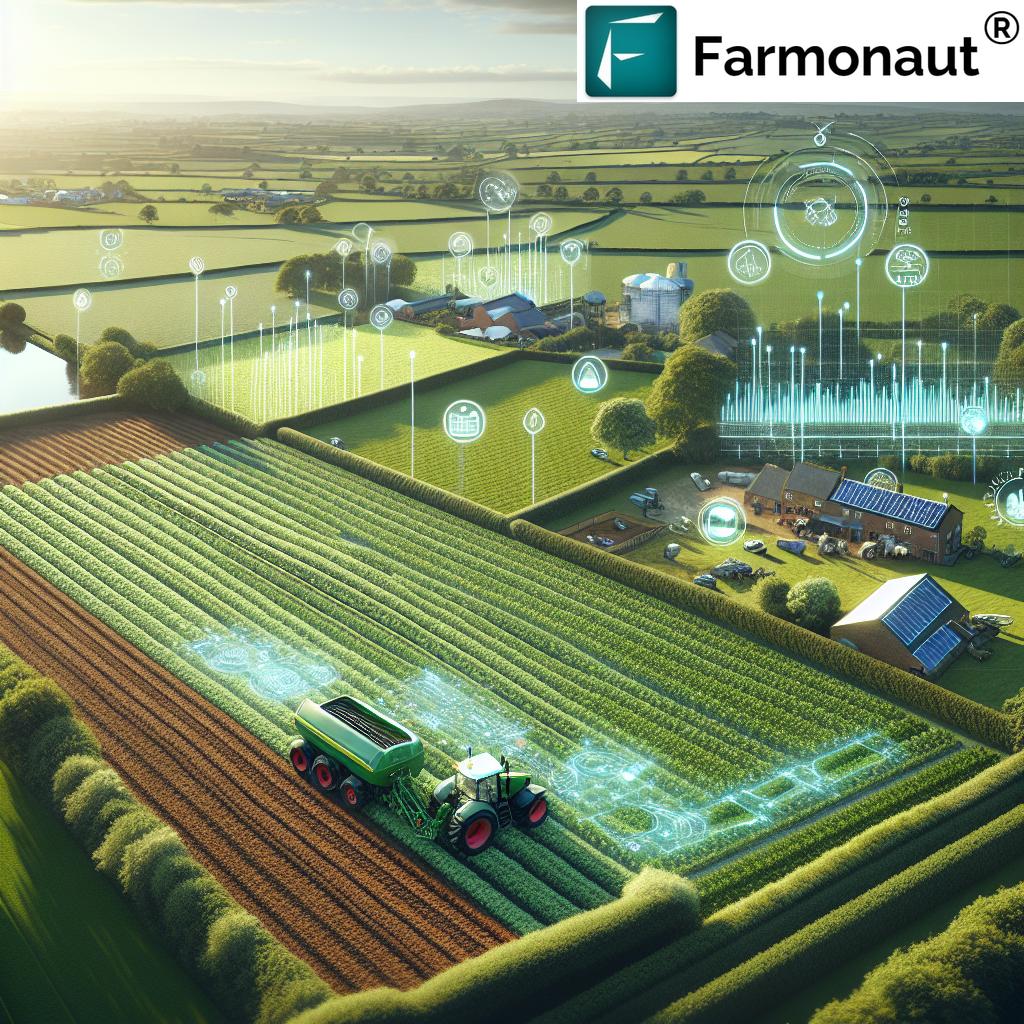From Tradition to Innovation: How a Somerset Dairy Farm Thrives with Sustainable Agriculture and Succession Planning
“A Somerset dairy farm team boasts 69 years of combined farming experience, revolutionizing sustainable agriculture practices.”
In the rolling hills of Somerset, a father-son dairy farm management team is rewriting the rulebook on sustainable agriculture practices. With a combined 69 years of farming experience, this dynamic duo has seamlessly blended time-honored traditions with cutting-edge agricultural innovation. Their journey from a conventional dairy operation to a beacon of modern farming techniques is not just inspiring—it’s a masterclass in farm business optimization.
The Genesis of a Dairy Dynasty
Our story begins in the heart of Somerset, where lush pastures have long been home to grazing cattle. It was here that our protagonists, a father-son team, embarked on their agricultural odyssey. The father, with decades of experience under his belt, brought a wealth of traditional farming knowledge. His son, armed with fresh perspectives and a keen interest in agritech solutions, complemented this wisdom perfectly.
Together, they’ve navigated the ever-changing landscape of British agriculture, facing challenges head-on and seizing opportunities for growth. Their journey is a testament to the power of combining experience with innovation, a strategy that has allowed them to not only survive but thrive in an industry known for its ups and downs.

A Transition Towards Quality: The Artisanal Cheese Revolution
“The farm transitioned from mass production to artisanal cheese-making, using milk from Holstein and Ayrshire cows for unpasteurized Cheddar.”
One of the most significant shifts in their farming journey was the transition from quantity-focused milk production to artisanal cheese production. This move wasn’t just about changing products; it was a fundamental shift in philosophy that aligned perfectly with contemporary consumer demands for quality and traceability.
The decision to focus on unpasteurized Cheddar made from Holstein and Ayrshire milk was a game-changer. It allowed them to tap into a niche market of cheese connoisseurs who appreciate the complex flavors and traditional methods of cheese-making. This shift not only increased their profit margins but also gave them a unique selling point in a crowded dairy market.
Embracing Agricultural Innovation: The Tech Revolution on the Farm
While the farm’s roots are deeply traditional, its branches reach far into the future of farming. The father-son team has been at the forefront of adopting agritech solutions to optimize their farm business. From precision agriculture techniques to advanced herd management systems, they’ve left no stone unturned in their quest for efficiency and sustainability.
One of the key technologies they’ve embraced is satellite-based crop monitoring. By leveraging services like those offered by Farmonaut, they’ve been able to monitor their pastures and fodder crops with unprecedented accuracy. This technology has allowed them to make data-driven decisions about irrigation, fertilization, and grazing patterns, significantly improving their resource management.
Farm Diversification Strategies: Beyond Dairy
Understanding the importance of not putting all their eggs in one basket, our Somerset farmers have implemented robust farm diversification strategies. While dairy remains at the core of their operation, they’ve expanded into several complementary areas:
- Agritourism: Opening the farm for tours and educational visits
- On-site farm shop: Selling their artisanal cheese and other local products
- Renewable energy: Installing solar panels and exploring small-scale wind power
- Crop rotation: Introducing arable crops to improve soil health and create additional income streams
These diversification efforts have not only created new revenue streams but also helped to buffer against the volatility often associated with dairy farming prices.
The Power of Partnership: A Father-Son Success Story
At the heart of this farm’s success is the strong partnership between father and son. Their relationship, built on mutual respect and complementary skills, has been the driving force behind the farm’s evolution. The father’s deep-rooted knowledge of traditional farming practices provides a solid foundation, while the son’s enthusiasm for modern techniques and technologies propels the farm into the future.
This synergy has allowed them to make bold decisions, such as the transition to artisanal cheese production, with confidence. It’s a prime example of how intergenerational collaboration can lead to innovation and success in agriculture.

Sustainable Agriculture Practices: A Commitment to the Future
Sustainability isn’t just a buzzword for this Somerset farm—it’s a way of life. The father-son team has implemented a range of sustainable agriculture practices that not only benefit the environment but also improve their bottom line:
- Rotational grazing: Maximizing pasture health and reducing the need for supplementary feed
- Water conservation: Implementing rainwater harvesting and efficient irrigation systems
- Soil management: Using cover crops and minimal tillage to improve soil structure and fertility
- Biodiversity promotion: Creating wildlife corridors and maintaining hedgerows
- Waste reduction: Implementing a comprehensive recycling program and exploring ways to turn waste into energy
These practices have not only reduced their environmental footprint but have also led to increased productivity and resilience in the face of climate change.
Leveraging Technology for Farm Management
In today’s digital age, effective farm management goes beyond traditional methods. Our Somerset farmers have embraced various technological tools to streamline their operations and make data-driven decisions. One such tool they’ve found invaluable is the Farmonaut app, which provides real-time insights into crop health and weather patterns.
By integrating these advanced farm management solutions, they’ve been able to:
- Optimize irrigation schedules based on accurate soil moisture data
- Detect early signs of crop stress or disease outbreaks
- Plan harvesting and grazing rotations with precision
- Monitor pasture health to ensure optimal feed for their dairy herd
The adoption of these technologies has not only improved their farm’s efficiency but has also positioned them as leaders in modern dairy farm management.
Agricultural Marketing Strategies: Selling the Somerset Story
In the competitive world of dairy products, our Somerset farmers understood that production was only half the battle—effective agricultural marketing strategies were crucial for success. They’ve crafted a compelling narrative around their farm, emphasizing:
- The heritage and tradition of Somerset cheese-making
- Their commitment to sustainable and ethical farming practices
- The unique flavor profile of their unpasteurized Cheddar
- The traceability of their products from “grass to cheese”
This storytelling approach has resonated with consumers who are increasingly interested in the provenance of their food. By leveraging social media, participating in farmers’ markets, and collaborating with local chefs, they’ve built a strong brand that commands premium prices for their artisanal products.
Farm Succession Planning: Securing the Future
One of the most critical aspects of their long-term strategy has been farm succession planning. The father-son team recognized early on that a smooth transition of farm ownership and management was essential for the continued success of their operation. Their approach to succession planning includes:
- Open and honest communication about future plans and expectations
- Gradual transfer of responsibilities to the younger generation
- Ongoing education and skill development for all family members involved in the farm
- Regular consultations with financial advisors and legal experts to navigate the complexities of farm transfer
- Creating a clear roadmap for the farm’s future, including potential expansions or diversifications
This proactive approach to succession has ensured that the farm will continue to thrive for generations to come, maintaining its place as a cornerstone of the Somerset agricultural community.
Balancing Tradition and Innovation: The Key to Success
The success of this Somerset dairy farm lies in its ability to balance tradition with innovation. While they honor the time-tested methods of cheese-making and animal husbandry that have been passed down through generations, they’re not afraid to embrace new technologies and practices that can improve their operation.
This balance is evident in their approach to:
- Herd management: Using traditional breeding techniques alongside modern genetic testing
- Pasture management: Combining rotational grazing with satellite-based monitoring
- Product development: Creating new cheese varieties while perfecting traditional Cheddar
- Marketing: Emphasizing their heritage while using digital platforms to reach new customers
By maintaining this delicate balance, they’ve created a farm that’s both rooted in history and poised for future success.
The Importance of Community and Collaboration
Our Somerset farmers understand that success doesn’t happen in isolation. They’ve actively fostered relationships within their local farming community and beyond. This network has proven invaluable for:
- Sharing knowledge and best practices
- Pooling resources for equipment purchases
- Collaborating on marketing initiatives
- Supporting each other during challenging times
Their involvement in local agricultural societies and farmer cooperatives has not only benefited their own operation but has also contributed to the overall strength and resilience of the Somerset farming community.
Navigating Challenges in the Agricultural Landscape
The journey of our Somerset dairy farmers hasn’t been without its challenges. They’ve had to navigate a complex and ever-changing agricultural landscape, including:
- Fluctuating milk prices and market volatility
- Changing consumer preferences and dietary trends
- Increasing regulatory requirements and compliance costs
- The impacts of climate change on weather patterns and crop yields
- Competition from larger, industrial-scale dairy operations
Their success in overcoming these challenges can be attributed to their adaptability, forward-thinking approach, and willingness to embrace new solutions. By staying informed about industry trends, participating in agricultural webinars, and continuously educating themselves, they’ve been able to stay ahead of the curve and turn potential threats into opportunities for growth.
The Role of Work-Life Balance in Farming
One often overlooked aspect of successful farming is maintaining a healthy work-life balance. Our Somerset farmers recognize that the demands of running a dairy farm can be all-consuming, but they’ve made a conscious effort to prioritize their well-being and that of their family. Some strategies they’ve implemented include:
- Structured work schedules that allow for regular time off
- Investing in automation to reduce the physical demands of farming
- Encouraging family members to pursue interests outside of the farm
- Regular family meetings to discuss farm operations and address any concerns
- Engaging in community activities and hobbies to maintain a sense of connection beyond the farm
This approach has not only improved their quality of life but has also contributed to the long-term sustainability of their farming operation by preventing burnout and fostering a positive attitude towards the work.
Looking to the Future: Continued Innovation and Growth
As our Somerset dairy farmers look to the future, they remain committed to innovation and growth. Some of the areas they’re exploring include:
- Further integration of AI and machine learning in farm management
- Expansion of their product line to include new cheese varieties and dairy products
- Exploration of export markets for their artisanal cheeses
- Collaboration with research institutions to develop more sustainable farming practices
- Investment in renewable energy to make the farm carbon-neutral
By continuing to push the boundaries of what’s possible in dairy farming, they’re not just securing their own future—they’re helping to shape the future of agriculture in Somerset and beyond.
Farm Transition Timeline
| Year | Milestone/Innovation |
|---|---|
| 1950 | Farm establishment |
| 1975 | Father joining the business |
| 2000 | Transition to artisanal cheese production |
| 2005 | Introduction of Holstein and Ayrshire cows |
| 2010 | Son joining the farm management team |
| 2015 | Implementation of agritech solutions |
| 2018 | Shift to unpasteurized Cheddar production |
| 2020 | Development of farm diversification strategies |
Conclusion: A Model for Modern Dairy Farming
The story of our Somerset dairy farmers is more than just a tale of agricultural success—it’s a blueprint for how traditional farms can thrive in the modern era. By embracing sustainable agriculture practices, leveraging agricultural innovation, and maintaining a strong commitment to quality and tradition, they’ve created a farm that’s not just profitable, but also resilient and forward-thinking.
Their journey from a conventional dairy operation to a leader in artisanal cheese production and sustainable farming practices serves as an inspiration to farmers across the UK and beyond. It demonstrates that with the right blend of experience, innovation, and adaptability, it’s possible to build a farming business that’s both economically viable and environmentally responsible.
As we look to the future of agriculture, farms like this one in Somerset will play a crucial role in shaping the industry. By continuing to innovate, collaborate, and prioritize sustainability, they’re not just securing their own future—they’re helping to ensure a bright future for British agriculture as a whole.
FAQ Section
Q: What were the key factors in the farm’s successful transition to artisanal cheese production?
A: The key factors included a deep understanding of traditional cheese-making techniques, investment in quality equipment, a focus on using milk from specific cow breeds (Holstein and Ayrshire), and effective marketing strategies that emphasized the unique qualities of their unpasteurized Cheddar.
Q: How has technology improved the farm’s operations?
A: Technology has played a crucial role in optimizing farm operations. The use of satellite-based crop monitoring, advanced herd management systems, and data-driven decision-making tools has improved efficiency, reduced resource waste, and helped in maintaining high standards of animal welfare and product quality.
Q: What advice would the farmers give to others considering farm diversification?
A: They would advise thorough market research, starting small and scaling gradually, leveraging existing strengths and resources, and being open to learning and adaptation. They would also emphasize the importance of maintaining focus on core competencies while exploring new opportunities.
Q: How do they balance traditional farming methods with modern innovations?
A: The balance is achieved by respecting and preserving traditional techniques that contribute to product quality and farm identity, while selectively adopting modern technologies and practices that improve efficiency, sustainability, and profitability. The key is to evaluate each innovation in the context of the farm’s overall goals and values.
Q: What role has succession planning played in the farm’s success?
A: Succession planning has been crucial in ensuring the farm’s long-term sustainability. By having open discussions about the future, gradually transferring responsibilities, and providing opportunities for the younger generation to contribute new ideas, they’ve created a smooth transition process that preserves the farm’s legacy while fostering innovation.
For those interested in leveraging technology for farm management, consider exploring the solutions offered by Farmonaut:
For developers interested in integrating agricultural data into their own applications, check out the Farmonaut API and the comprehensive API Developer Docs.
















